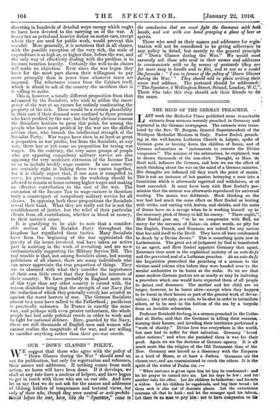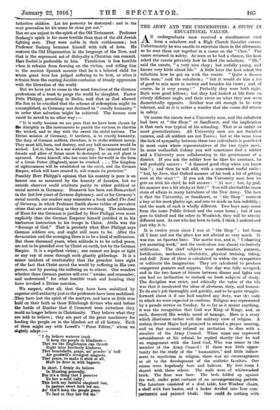THE MEND OF THE GERMAN PREACHER.
TAMP week the Methodist Times published some remarkable extracts from sermons recently preached in Germany and reprinted in the German newspapers. The extracts were trans- lated by the Rev. W. Burgess, General Superintendent of the
Wesleyan Methodist Missions in Italy. Pastor Zoebel, preach- ing t. in the well-known Lutheran Church in Leipsic, spoke of
German guns as beating down the children of Satan, and of German submarines as " instruments to execute the Divine vengeance." The mission of the submarines, he explained, was to drown thousands of the non-elect. Thought, as Mine. de ' Steel said, inflames the German, and here we see the effect of much thinking about the war on the mind of a German minister. His thoughts are inflamed till they reach the point of mania. This is not an instance of hot passion betraying a man into a fanaticism which is afterwards regretted and withdrawn, or at least concealed. It must have been with Herr Zoebel's per- mission that the sermon was afterwards reproduced for universal *, reading. The mania was deliberate. Much thinking on the war had had much the same effect on Herr Zoebel as beating t, with sticks, and cutting with knives, and shrieks, and the noise of drums have on a savage when he is working himself up to the necessary pitch of frenzy to kill his enemy. " There ought,"..i Herr Zoebel goes on, " to be no compromise with Hell, no : mercy for the servants of Satan—in other words, no pity for the English, French, and Russians, nor indeed for any nation that has sold itself to the Devil. They have all been condemned to death by a Divine decree." This is something quite new in Lutheranism. The great act of judgment by God is transferred to an agent, and Herr Zoebel appoints Germany that agent.; Extremes thus meet in the sophistical zealotry of an auto-da-p and the perverted zeal of a Lutheran preacher. At an auto-dale s the Inquisition prescribed the preaching of a sermon to the victims amid solemn rites before they were handed over to the secular authorities to be burnt at the stake. So we see that some modern German pastors are as nearly as may be imitating - a procedure which one would have expected them of all people , to detest and denounce. The mother and her child are ne longer, however, to be burnt alive—except when they happen'' to be burnt in their houses as part of the general work of devas- tation ; they are only, as a rule, to be shot in order to intimidate 1 others, or to be sent to the bottom of the sea by a torpedo from an invisible submarine.
Professor Reinhold Seeberg, in a sermon preached in the Catheo drat at Berlin, said that the Germans in killing their enemies, -.. burning their houses, and invading their territories performed a "work of charity." Divine love was everywhere in the world, but men had to suffer for their salvation. Germany " loved other nations," and when she punished them it was for their good. Again we see the doctrine of German agency. It is all much more like the religion of the Old Testament than of the New. Germany sees herself as a theocracy with the Emperor as a kind of Moses, or at least a Joshua. Germans are the chosen race, and are commissioned to crush the others. It is the spirit of the writer of Psalm dz. • " When sentence is given upon him let him be condemned : and ' let his prayer be turned into sin. Let his days be few : and letri: another take his office. Let his children be fatherless : and his wife a widow. Let his children be vagabonds, and beg their bread : let them seek it also out of desolate places. Let the extortioner consume all that he hath : and let the stranger spoil his labour.. Let there be no man-to pity him: nor to have compassion on his
fatherless children. Let his posterity be destroyed : and in the next generation let his name be clean put out."
But we are unjust to the spirit of the Old Testament. Professor Seeberg's spirit is far more terrible than that of the old Jewish fighting men. They were noble in their ruthlessness ; but Professor Seeberg bemuses himself with talk of love. He restores the Old Dispensation in the language of the New, and that is the supremest act of disloyalty a Christian can commit. Herr Zoebel is preferable to him. Fanaticism is less horrible when it refrains from fawning on the victim, and telling him in the ancient Spanish manner that he is a beloved child for whom great love has judged suffering to be best, or when it refrains from the canting Jacobin confusion of bloody oppression with the liberation of the world.
But we have yet to come to the most ferocious of the German professions of a trust to purge the world by slaughter. Pastor Fritz Philippi, preaching in Berlin, said that as God allowed His Son to be crucified that the scheme of redemption might be accomplished, so Germany was destined to " crucify humanity ", in order that salvation might be achieved. The human race could be saved in no other way :-
" It is really because we are pure that we have been chosen by dm Almighty as His instruments to punish the envious, to chastise the wicked, and to slay with the sword the sinful nations. The Divine mission of Germany, 0 brethren, is to crucify humanity. The duty of German soldiers, therefore, is to strike without mercy.
They must kill, burn, and destroy, and any half-measures would be wicked. Let it, then, be a war without pity. The immoral and the friends and allies of Satan must be destroyed, as an evil plant is - uprooted. Satan himself, who has come into the world in the form of a Great Power (England), must be crushed. . . . The kingdom of righteousness will be established on the earth, and the German Empire, which will have created it, will remain its protector."
Possibly Herr Philippi's opinion that his country is pure is an honest one as measured by the honesty of fanatics, but no outside observer could attribute purity to either political or social morals in Germany. Bismarck has been out-Bismarcked in the last few years of German diplomacy, and as for Germany's social morals, our readers may remember a book called The Soul of Germany, in which Professor Smith shows tables of prevalent crime that are as startling as they are revolting. The nickname of Huns for the Germans is justified by Herr Philippi even more explicitly than the German Emperor himself justified it in his barbarous instruction to his troops in China. Attila was the "Scourge of God." That is precisely what Herr Philippi says German soldiers are, and ought still more to be After the devastation and the scourging there is to be a kind of millennium. But those thousand years, when solitude is to be called peace, are not to be presided over by Christ on earth, but by the German Empire. It is a repellent vision ; one cannot see hope or light or any ray of sense through such ghastly gibberings. It is a minor incident of irrationality that the preacher loses sight of the fact that Christ saved the world by suffering in His own person, not by passing the suffering on to others. One wonders whether these German pastors will ever " awake, and remember, and understand" for what horrible trash and humbug they have invoked a Divine sanction.
We suspect, after all, that they have been mobilized by superior civil authority just as the professors have been mobilized. They have lost the spirit of the martyrs, and have as little true hold on their faith as those Edinburgh divines who said before the battle of Dunbar that if Cromwell were victorious they could no longer believe in Christianity. They believe what they are told to believe ; they are part of the great machinery for leading the people on in the blindest act of all history. Each of them might say with Lowell's " Pious Editor," whom we slightly adapt :—
" I du believe wutever trash
'11 keep the people in blindness- Thet we the Englishmen can thrash Right inter brotherly kindness, Thet bombshells, grape, an' powder 'n' ball' Air goodwill's strongest magnets, That peace, to make it stick at all,
Must be dray in with bagnets.
In short, I firmly du believe In Humbug generally, For it's a thing that I perceive To her a solid wally ; This heth my faithful shepherd ben,
In pasture sweet heth led me,
An' this'll keep the people green To feed ez they hes, fed me.'



































 Previous page
Previous page